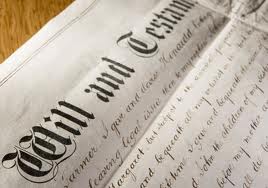 It is a very common question that arises. And the question can occur at any time in one’s life, whether taking that first new job, getting married, having children, getting divorced, or preparing for retirement. “Should I have a will?” is the common question. The emphatic response is “Yes”. There are many reasons to have a will prepared. And not just prepared yourself utilizing some on-line, generic service. You are best served by having a seasoned New York wills and trusts attorney prepare a will that is uniquely tailored to meet your individualized estate needs.
It is a very common question that arises. And the question can occur at any time in one’s life, whether taking that first new job, getting married, having children, getting divorced, or preparing for retirement. “Should I have a will?” is the common question. The emphatic response is “Yes”. There are many reasons to have a will prepared. And not just prepared yourself utilizing some on-line, generic service. You are best served by having a seasoned New York wills and trusts attorney prepare a will that is uniquely tailored to meet your individualized estate needs.
In New York State, if you die without a will, you are deemed to have died “intestate”, which means the decedent did not have a will as of the date of death. In that event, the distribution of one’s property becomes a statutory determination set forth in the Estates Powers and Trusts Law (EPTL). If one dies without a will, the portion of the estate which would normally pass through the probate process (if one died with a will) is set by law, and the decedent has no say as to the distribution of such assets. Any assets which are owned solely by the decedent, and do not have any named beneficiaries, are passed onto surviving heirs as follows: first $50,000 plus ½ of the estate to the surviving spouse, with the remaining ½ of the estate to any surviving children. If there is no surviving spouse, then the surviving children would equally share in the decedent’s estate. EPTL 4-1.1 sets forth all various scenarios involving what surviving members would receive various shares of the estate.
The important component to remember is that if you have an experienced New York estate attorney draft a will, you have a direct say in all aspects of your estate. For example, you can determine how you want tangible property (i.e., jewelry, fine china, family heirlooms) to be distributed. You can further make specific bequests to various family members, although if you shortchange your spouse, they can always file for their right of election share (greater of $50,000 or 1/3 of the gross estate (including testamentary substitutes).
You can further determine if you want any charitable contributions to be made to any organizations which you hold close to you. You can plan for who should be the custodian in the event that any beneficiary under the will is a minor (18 or 21 years of age, depending on your choice).
Finally, you make the determination as to who should be the executor (and successor executor) for your estate, a choice which you should not take lightly since this individual is ordinarily given broad based powers to invest, sell, and distribute assets according to your wishes. The executor becomes a fiduciary who must account to the Surrogate’s Court as to how they distributed the probate assets of the decedent.
In conclusion, I wholeheartedly believe any resident of New York State should have a will drafted for them, and that the will should be prepared by a dedicated, professional New York Wills, Trusts, and Estates Attorney.